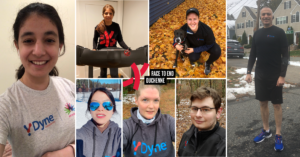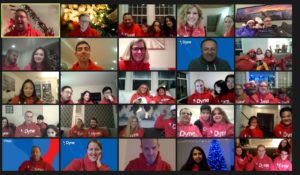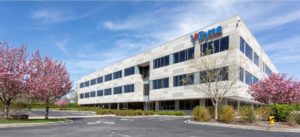By Joshua Brumm, CEO of Dyne Therapeutics, as part of the From The Trenches feature of LifeSciVC
I’ve been thinking a lot about growth, and for good reason: Dyne is in the midst of a significant scale-up.
We expanded our team by about 30 employees last year and plan to nearly double our workforce this year. We’re moving to a new office and lab space. Most importantly, we’re planning for the crucial transition from research-stage to clinical-stage – not just in one program, but across the breadth of our pipeline, as we plan to file three INDs between the fourth quarter of this year and fourth quarter of 2022.
This is a critical time for Dyne as we drive toward our goal to build the world’s leading muscle disease company. As we grow, it’s important to me, and to the entire Dynamo team, that we hold on to the “special sauce” that makes Dyne such a great place to work and a leader in advancing potentially transformative therapeutics for serious muscle diseases.
How do we preserve our culture while essentially quadrupling in size over just two years? I’ve distilled my answer into three key ingredients. All three are core to my vision of leadership and, in my view, are essential to nurturing a strong culture at a time of rapid growth.
One mission, no ego
This principle – which might sound familiar if you read my April 2020 blog on leadership – is absolutely foundational to Dyne.
First, the mission: To hold ourselves steady as we catapult forward, we must keep our eyes firmly fixed on our mission: to deliver life-transforming therapies for people living with serious muscle diseases. To reach our ambitious goals, we must all know exactly both where we’re headed and how we get there. That unity of purpose is especially critical as a company scales and grows.
Next, the egos: This may sound self-explanatory, but it’s one of the toughest values to put into action day in and day out. To me, “no ego” means far more than defusing people who over-inflate their own importance. I’m also trying to strike a blow against the bunker mentality that can pervade biotech companies. That’s why I urge everyone at Dyne to resist referring to “my team” or “my group.” We hold ourselves accountable as a team and a company, but we don’t foster an environment where managers feel they “own” a particular function or employees value their immediate colleagues above the broader Dyne family. Loyalty to a team can be admirable, but it can also create a territorial atmosphere, where each function guards its turf and flexes its power. That not only damages the culture, but also risks undermining progress on the mission.
I actively encourage people to seek ideas from colleagues outside their functions. I think our scientists can benefit from input from those who aren’t in the labs every day and the same holds true for employees in our G&A functions gaining insight from our R&D teams who might approach a challenge or project in a different way. As I’ve seen time and time again, in both my personal life and my professional life, an unexpected perspective can spur a breakthrough.
This approach requires actively listening respectfully to all constructive ideas and being open to help from anyone, regardless of their title. We make it clear at every opportunity that this is the Dyne way, and I work hard to model this behavior every day. I also make a point of giving real-time feedback if I see people slipping into a silo mentality or flexing their own egos by reminding them: “That’s not thinking of the broader mission,” or “And, remember, it’s team and mission first.”
Comfort is the enemy of progress and innovation
While I want everyone at Dyne to feel 100% comfortable voicing their views on how best to advance the mission, I never want them to be 100% satisfied with where we are now. We can only succeed if we all push ourselves, and one another, beyond our comfort zones.
To be clear: We will never, ever sacrifice safety or quality in the name of speed. (In fact, one of our core operating principles is: “1) Quality, 2) Speed, 3) Cost – Always in that order!”) Still, to achieve our goals, we need to keep a foot on the gas. We can’t afford for anyone to feel complacent or get too settled into a routine.
I used to frame this concept this way: “If you don’t stretch, you don’t grow. And stretching is painful at times.” Then I saw the documentary “Free Solo,” which chronicles rock climber Alex Honnold’s incredible drive to scale the 3,000-foot face of El Capitan in Yosemite without a rope. Alex talks about how you must push yourself out of your comfort zone to achieve your goals; complacency inevitably leads to failure. I’ve since adopted the mantra: “Comfort is the enemy of progress and innovation.”
 When we’re hiring, I look for this attribute in prospective employees. I try to get a sense of whether they have that hunger to go above and beyond, even when they need to push well beyond their normal comfort zone. We need folks who have that hunger. This quality is even more important as we grow. Inevitably, roles change, and responsibilities shift as you bring on new team members and move into new phases of the work. We need Dynamos who are not only willing, but excited to adapt.
When we’re hiring, I look for this attribute in prospective employees. I try to get a sense of whether they have that hunger to go above and beyond, even when they need to push well beyond their normal comfort zone. We need folks who have that hunger. This quality is even more important as we grow. Inevitably, roles change, and responsibilities shift as you bring on new team members and move into new phases of the work. We need Dynamos who are not only willing, but excited to adapt.
Family matters
We debated long and hard whether to use the term “Dyne Family” in our core values. We didn’t want to imply that your work would supplant your home life, or that you were required to be close to each and every colleague. In the end, though, we decided to go for it, because we believe the notion that we pull together as a family is core to our culture and key to our success.
What does Dyne Family mean? It means that we act with positive intent – and that we assume positive intent from others. It means we don’t play the blame game when things go wrong; we work together to find solutions. We don’t snipe; we listen. We don’t grumble; we solve problems. In other words, we hold ourselves accountable for nurturing healthy relationships and successful team dynamics.
Again, it’s crucial that we maintain this sense of family as we grow. Like many biotechs, we have a culture team that is helping us to think about how to best intentionally manage our culture as we grow, including ensuring we are living our core values and organizing fun (often virtual) activities to bring us together. 
During the pandemic, we also made the decision to secure access to a large indoor space near our current offices a couple days a week. It’s big enough that we can bring together the leadership team while maintaining safe distances. Having this extra space, along with weekly COVID-19 testing for all employees, ensures we can gather without pushing the COVID-era occupancy limits in our office. That opportunity to spend time together “in 3-D” rather than on Zoom has been enormously helpful in maintaining our sense of family during the pandemic – and during a time of rapid growth at the company.
We’re thinking very intentionally about how to nurture the Dyne Family when we relocate to our new office later this year. We are creating an all hands/cafeteria space that we will call the “Family Room” so when pandemic restrictions lift, we can gather together to work through challenges, celebrate milestones or simply chat over lunch. We have also articulated “operating norms,” which lay out our vision for what it means to live the core values we have defined as a of the Dyne Family. We’ve shared these norms across the full team and will continue to introduce them to each new hire during onboarding. My hope is that with this shared understanding of how we live our organizational values in our work, we will retain our strong culture even with the rapid growth we have planned for the next year.
I’m proud of all we’ve accomplished at Dyne and I’m looking forward to the transformational period we’re now entering. We are advancing at an incredible pace but with a strong sense of our mission, our culture and our Dyne Family – we’re excited about where we’re headed.






